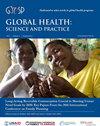利用成人学习原则加强量身定制免疫计划的能力:尼日利亚案例研究。
IF 2.5
3区 医学
Q2 PUBLIC, ENVIRONMENTAL & OCCUPATIONAL HEALTH
引用次数: 0
摘要
导言:尼日利亚是非洲未接种任何疫苗的儿童人数最多的国家。用于培训项目管理人员(PMs)和医护人员(HCWs)的培训师培训(TOT)模式在成人学习方面效果不佳,限制了免疫接种项目的成功。我们将成人学习原则(ALPs)融入到免疫接种项目管理人员和医护人员的培训设计和实施中,以便利用数据让社区参与到量身定制的免疫接种策略中来:我们的研究在尼日利亚联邦首都特区的 3 个地方政府辖区(LGAs)进行。根据提供免疫接种培训的最佳实践和培训需求评估结果,制定了一套培训课程,其中整合了 ALPs 以及技术和操作内容。州项目管理人员(10 人)、地方政府项目管理人员(30 人)和医护人员(42 人)接受了使用 ALPs 的以人为本的免疫规划定制设计(HCD-TIP)方法培训。我们采用访谈和调查的方式,分别有目的性地抽取了项目管理人员和社区保健工作者,并通过观察来评估参与者的满意度、知识和能力、行为变化和结果。对访谈进行了专题分析,对调查进行了统计分析:结果:地方社区项目管理人员(100%)、州项目管理人员(91%)和保健医生(85%)对培训的满意度很高,培训后知识和能力都有显著提高(P<.001)。接受过培训的学员与 24 个疫苗接种不足的社区开展了 2 次 "人的发展 "课程,并共同设计了 24 个原型解决方案进行测试。结果显示,12 个参与社区的五价疫苗第一剂(54%)和第三剂(188%)覆盖率均有所提高。在实践中,社区合作、沟通技巧和数据驱动方法的改善是最常被提及的行为改变:在培训中应用 ALPs、使用 HCD-TIP 方法和工具以及支持性监督提高了 PM 和 HCW 针对性干预的能力。各国应考虑采取综合方法,重点在免疫接种计划中使用这些方法,以加强卫生系统,实现公平的疫苗覆盖率。本文章由计算机程序翻译,如有差异,请以英文原文为准。
Strengthening Capacity for Tailored Immunization Programs Using Adult Learning Principles: A Case Study from Nigeria.
Introduction: Nigeria has the highest number of children who have not received any vaccines in Africa. The training-of-trainers (TOT) model used to train program managers (PMs) and health care workers (HCWs) is ineffective for adult learning and limits immunization programs' success. We incorporated adult learning principles (ALPs) in designing and delivering TOT for immunization PMs and HCWs to use data to engage communities for tailored immunization strategies.Methods: Our study was implemented in 3 local government areas (LGAs) of the Federal Capital Territory, Nigeria. A training curriculum was developed, integrating ALPs and technical and operational content based on best practices in delivering immunization training and the training needs assessment findings. State PMs (n=10), LGA PMs (n=30), and HCWs (n=42) were trained on the human-centered design for tailoring immunization programs (HCD-TIP) approaches using ALPs. We used interviews and surveys with purposively and conveniently sampled PMs and HCWs, respectively, and observations to assess participants' satisfaction, knowledge and competence, behavior changes, and results. The interviews were analyzed thematically, and surveys were statistically.Results: There was a high level of satisfaction with the training among LGA PMs (100%), state PMs (91%), and HCWs (85%), with significant knowledge and competence improvements post-training (P<.001). The trained participants conducted 2 HCD sessions with 24 undervaccinated communities and co-designed 24 prototype solutions for testing. Results showed increased coverage of the pentavalent vaccine first dose (54%) and third dose (188%) across 12 participating communities. Improved community colaboration, communication skills, and data-driven approaches were the most cited behavior changes in practice.Conclusion: The application of ALPs in training, use of HCD-TIP approaches and tools, and supportive supervision enhanced PMs' and HCWs' capacity for tailored interventions. Countries should consider adopting a holistic approach that focuses on using these approaches in immunization programs to strengthen the health system for equitable vaccine coverage.
求助全文
通过发布文献求助,成功后即可免费获取论文全文。
去求助
来源期刊

Global Health: Science and Practice
Medicine-Health Policy
CiteScore
3.50
自引率
7.50%
发文量
178
审稿时长
22 weeks
期刊介绍:
Global Health: Science and Practice (GHSP) is a no-fee, open-access, peer-reviewed, online journal aimed to improve health practice, especially in low- and middle-income countries. Our goal is to reach those who design, implement, manage, evaluate, and otherwise support health programs. We are especially interested in advancing knowledge on practical program implementation issues, with information on what programs entail and how they are implemented. GHSP is currently indexed in PubMed, PubMed Central, POPLINE, EBSCO, SCOPUS,. the Web of Science Emerging Sources Citation Index, and the USAID Development Experience Clearinghouse (DEC).
TOPICS:
Issued four times a year, GHSP will include articles on all global health topics, covering diverse programming models and a wide range of cross-cutting issues that impact and support health systems. Examples include but are not limited to:
Health:
Addiction and harm reduction,
Child Health,
Communicable and Emerging Diseases,
Disaster Preparedness and Response,
Environmental Health,
Family Planning/Reproductive Health,
HIV/AIDS,
Malaria,
Maternal Health,
Neglected Tropical Diseases,
Non-Communicable Diseases/Injuries,
Nutrition,
Tuberculosis,
Water and Sanitation.
Cross-Cutting Issues:
Epidemiology,
Gender,
Health Communication/Healthy Behavior,
Health Policy and Advocacy,
Health Systems,
Human Resources/Training,
Knowledge Management,
Logistics and Supply Chain Management,
Management and Governance,
mHealth/eHealth/digital health,
Monitoring and Evaluation,
Scale Up,
Youth.
 求助内容:
求助内容: 应助结果提醒方式:
应助结果提醒方式:


